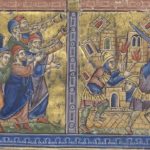We run our website the way we wished the whole internet worked: we provide high quality original content with no ads. We are funded solely by your direct support. Please consider supporting this project.

What Type of Faith Do You Have?
Genesis 32 tells the story of Jacob, wrestling through the night with a nameless man, revealed to be none other than God Himself. We read that when this man “saw that he could not overpower” Jacob, he “touched the socket of Jacob’s hip so that his hip was wrenched as he wrestled with the man” (v. 25).
It is only at daybreak, after a long night of wrestling, that the Lord entreats Jacob to end his struggle (v. 26). However, Jacob refuses to release his grip until he receives a blessing. The Lord responds by asking, “What is your name?” This request leads to the punch line of the story. Apparently willing to do whatever it takes to receive a “blessing” from his wrestling partner, Jacob gives his name, at which point the Lord immediately informs him that his name is about to change. From now on, the Lord says, Jacob will be called Israel because he has “struggled with God and with human beings and overcome.”
“Jacob” did not become “Israel” because he overpowered the Lord, but because he had the audacity to wrestle with God, holding on until he received the “blessing” for which he fought. This new christening speaks to what I call an Israelite Faith: a faith that calls for the courage to struggle honestly with the Creator, having even the audacity to wrestle in pursuit of blessing.
However, there is more to this name change. The meaning of “Jacob” in popular usage of the time literally means “heel catcher,” for Jacob was born grabbing the heel of his twin brother, Esau (Gen 25:26). It has the connotation of one who connives to supplant another, and the story of Jacob bears this out as he was a true trickster.
The meaning of “Jacob” challenges our ordinary conceptions of faith and how it works. Often, what masquerades as faith is really a form of mental trickery: we artificially convince ourselves, side-step hard questions, and avoid at all cost the courageous wrestling God here applauds. We follow disingenuously, trying to believe the right things, use the right pious language, and act in the right ways in order to get something from God, whether it be salvation or healing or some other blessing.
When we do this, we do not base our faith on an honest and rational evaluation of the merits of what we profess to believe. Rather, we avoid facts and arguments that might shake our faith. In other words, much of what we call faith today is Jacob-like, not Israel-like.
The biblical heroes of the faith are better known for their willingness to be uncomfortable and to wrestle honestly with God. We see this in Genesis 18 with Abraham, who questioned God’s justice. Moses objected to God’s plans to destroy the Israelites in Exodus 32. Jeremiah objected to God’s actions—or at least what he thought were his actions (Jer 12:1; 14:8-9). And Habakkuk expressed his anger and confusion about God’s apparent inconsistency.
Israelite faith is not a faith centered on right beliefs and pious, religious language. And it’s certainly not a faith that focuses on fostering a sense of security at cost to real reflection. Rather, it’s a faith so grounded in authenticity that is unwilling to sweep questions, doubts, and complaints under a pious rug to avoid pain and uncertainty. It’s a faith that is not afraid to go to the mat with God.
—Adapted from Benefit of the Doubt, pages 78-83
Category: General
Tags: Faith, Israel, Jacob
Topics: Faith & Doubt
Related Reading

This Week’s Sermon: Sledge Hammer Faith
Greg is feverishly working on a new book on faith and doubt and he decided to preach on this topic for a couple of weeks. He’s also been dealing with this topic on the blog as a part of fleshing out the ReKnew Manifesto. This week he asks the question: Is certainty-seeking, doubt-shunning faith idolatrous? Many…

Reading the Bible “by Faith”
The cruciform approach to reading the Bible—and specifically the culturally-conditioned and sin-stained portraits of God—requires faith on the part of the reader, which I argue in Crucifixion of the Warrior God. On one level we can discern by faith that often times God broke through the limitations and sin of the ancient authors, for we…

The Good News That’s Really “Good”
Often we view our relationship with God in terms of a legal contract. For instance, people often ask questions about salvation in this way. They see God as the judge, we are defendants, and salvation is about staying out of prison. With this perspective, questions about salvation and the Gospel—which means “good news”—are about the…

Court-of-Law Theology: How It Falls Short
Courtney “Coco” Mault via Compfight Last week, we introduced a way of talking about theology with concentric circles. This approach is distinct from the common Western model of theology that depends upon a court-of-law framework. The following is an excerpt from Greg’s book Benefit of the Doubt regarding this: ____________________________ Within the legal strand of…

What Does ‘Your Faith Has Healed You’ Mean? (podcast)
Greg discusses faith, doubt, and healings. Episode 486 http://traffic.libsyn.com/askgregboyd/Episode_0486.mp3

Paul Was Not Writing about Personal Salvation: Romans 9, Part 2
In yesterday’s post, I summarized the deterministic interpretation of Romans 9 and offered the first argument against it. In this post I offer the second and third of six arguments that reveal that there is something else going on in Romans 9. Argument #2: Has God Broken Covenant? The deterministic interpretation of Romans 9 assumes that…
